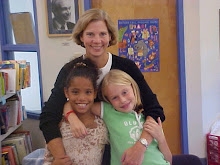In 2-3 children learn to give a "compliment sandwich" - feedback that includes first a compliment, then a suggestion, then a compliment. The writer can take the advice - or not - and continue revising. The kids also read great poems, noticing what makes them great.
Here is an article by Mark Yakich in the Atlantic, What's a Poem? You read it. It reads you. An object lesson. He says, Because of its special status—set apart in a magazine or a book, all that white space pressing upon it—a poem still has the ability to surprise, if only for a moment which is outside all the real and virtual, the aural and digital chatter that envelopes it, and us.
Here is the poem of a third grader, Madeline, after revising her first draft with the help of critique.
I am...
I am birds singing
I am math
I am water cascading over rocks
I am books with a good story
I am music fresh from the violin
I am water cascading over rocks
I am fall
I am winter
I am water cascading over rocks
I am wild animals
I am a creek
I am the ocean hustling and bustling with life
I am water cascading over rocks
I am cute seals sunning on boulders
I am water cascading over rocks
I am the earth recovering from humans






